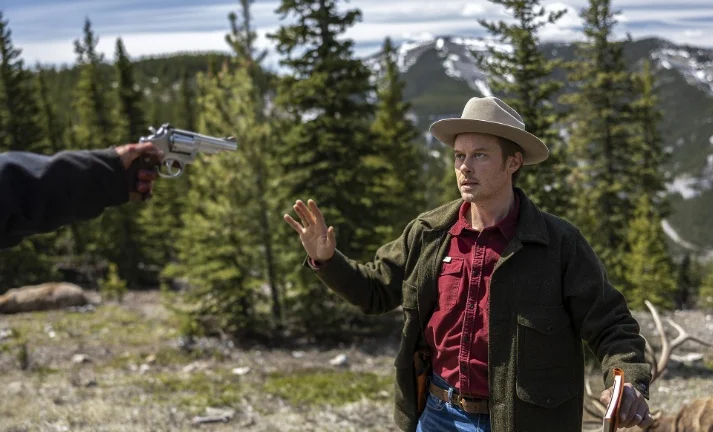Watch series: Joe Pickett (2021–2023)
I. INTRODUCTION
Joe Pickett is not the kind of show that screams for attention. It doesn’t rely on loud gunfights, flashy plot twists, or mythical heroism. Instead, it builds itself quietly—like snow layering over a forgotten trail, like a whisper in the deep woods of Wyoming. Based on the bestselling novels by C.J. Box, this two-season neo-Western series draws its strength from restraint: a sense of realism, emotional grit, and a world where justice must be earned step by careful step.
At its core is a humble man—a state game warden named Joe Pickett—who finds himself at the center of rising chaos in a rural town where nature, politics, and violence collide.
II. STORY OVERVIEW
The first season opens with Joe and his young family relocating to Saddlestring, Wyoming, where he has been assigned as the area’s new game warden. Quiet, principled, and perhaps too trusting, Joe’s role is simple on paper: protect wildlife and enforce hunting regulations. But from the very beginning, things are anything but peaceful.
A poacher is found dead near Joe’s property, and what follows is a slow unraveling of secrets buried beneath the surface of this isolated community. Land disputes, illegal wildlife trades, and corrupt political maneuverings begin to reveal themselves, pulling Joe into a web of danger he is neither trained nor prepared for.
Season two raises the stakes. Now more entangled in the region’s power dynamics, Joe faces threats not just to the land, but to his family. Missing persons, militant environmentalists, and moral compromises close in from all sides. As Joe digs deeper, he discovers that justice in a town like Saddlestring is fragile—and sometimes, deadly.
III. CHARACTER EXPLORATION
What makes Joe Pickett compelling isn’t just its mystery—it’s the people caught within it.
- Joe Pickett is not a traditional Western hero. He doesn’t shoot first or ride into town with swagger. He’s awkward, deeply moral, and slightly overwhelmed by the world around him. Yet that’s precisely what makes him captivating. He’s the kind of man who still believes in institutions, even as those institutions fail him. His strength lies in stubborn integrity.
- Marybeth Pickett, Joe’s wife, is far from a passive character. A former lawyer, she is sharp, grounded, and emotionally resilient. She’s the moral compass Joe often leans on, and together, their bond becomes a quiet anchor in a town that seems to reward betrayal over truth.
- Nate Romanowski, a rogue falconer and survivalist, stands as Joe’s shadow. He’s violent, unpredictable, but driven by a code of his own. Their uneasy alliance becomes one of the series’ richest relationships—a juxtaposition between man of law and man of instinct.
- Around them, the supporting cast fills out a complex portrait of frontier life: corrupt sheriffs, ruthless land developers, bitter ranchers, and outsiders with their own buried pasts. No one is entirely innocent, and no one is completely lost.

IV. THEMES & SYMBOLISM
Beneath its crime-thriller surface, Joe Pickett speaks to deeper American anxieties—about power, land, masculinity, and the slow erosion of moral clarity.
The show revolves around a central question: What happens when the systems meant to protect us turn against us—or vanish altogether? In a town where justice is rarely served through courts, where politics override law, Joe becomes the last thread holding back the collapse.
But even he is not unbreakable. As the story progresses, his trust in the system fractures. The badge he wears begins to weigh heavier. He must decide: is following the rules enough—or must he start bending them to survive?

Nature itself plays a symbolic role. The forests, rivers, and mountains are not just background—they are witnesses. Often silent, often beautiful, and occasionally deadly, the wilderness reflects the emotional isolation and moral wildness Joe finds himself caught in.
V. TONE, CINEMATOGRAPHY & PACING
Joe Pickett adopts a measured pace. It doesn’t rush its revelations or characters. Like a snowfall, tension accumulates slowly—until it breaks loose.
Visually, the series is stunning in its quietude. Long shots of empty highways, sweeping mountain ranges, and dense pine forests create an atmosphere of eerie stillness. There’s a constant sense that something is watching from the trees—be it animal, man, or consequence.

The sound design embraces silence. There’s little music, and instead, the series relies on natural sounds—creaking doors, wind through the grass, birds overhead—to keep the viewer immersed. When violence does erupt, it lands hard and without glamour.
VI. STRENGTHS & LIMITATIONS
What Joe Pickett does best is build a world where morality isn’t black and white—but not entirely gray either. It believes in decency, in doing the right thing, but never pretends that doing so is easy or without cost.
Its emotional strength comes from small things: a father trying to protect his children, a wife refusing to look away, a neighbor knowing too much and saying too little.

However, the show’s measured tone and low-key plotting may not suit viewers craving high-octane drama. Some subplots—particularly Joe’s PTSD or political flashbacks—are occasionally repetitive. But in the grand scheme, these are minor flaws in a show that earns its emotional gravity the slow, honest way.
VII. FINAL VERDICT
Joe Pickett is a rare gem—a series that dares to be quiet in a world of noise. It asks you to sit with its characters, to walk their trails, and to feel the tension in every creaking floorboard and rustling tree.
It’s not just about solving crimes; it’s about holding on to your principles in a world where every path seems compromised. It’s about surviving not just nature, but human nature.
In the end, Joe Pickett isn’t the story of a hero saving a town—it’s the story of a man refusing to look away from what’s broken, even when no one else is watching.
Overall Rating: 8.5/10
Highly recommended for fans of Longmire, Wind River, Yellowstone, or anyone drawn to the modern Western’s quieter, more reflective side.
